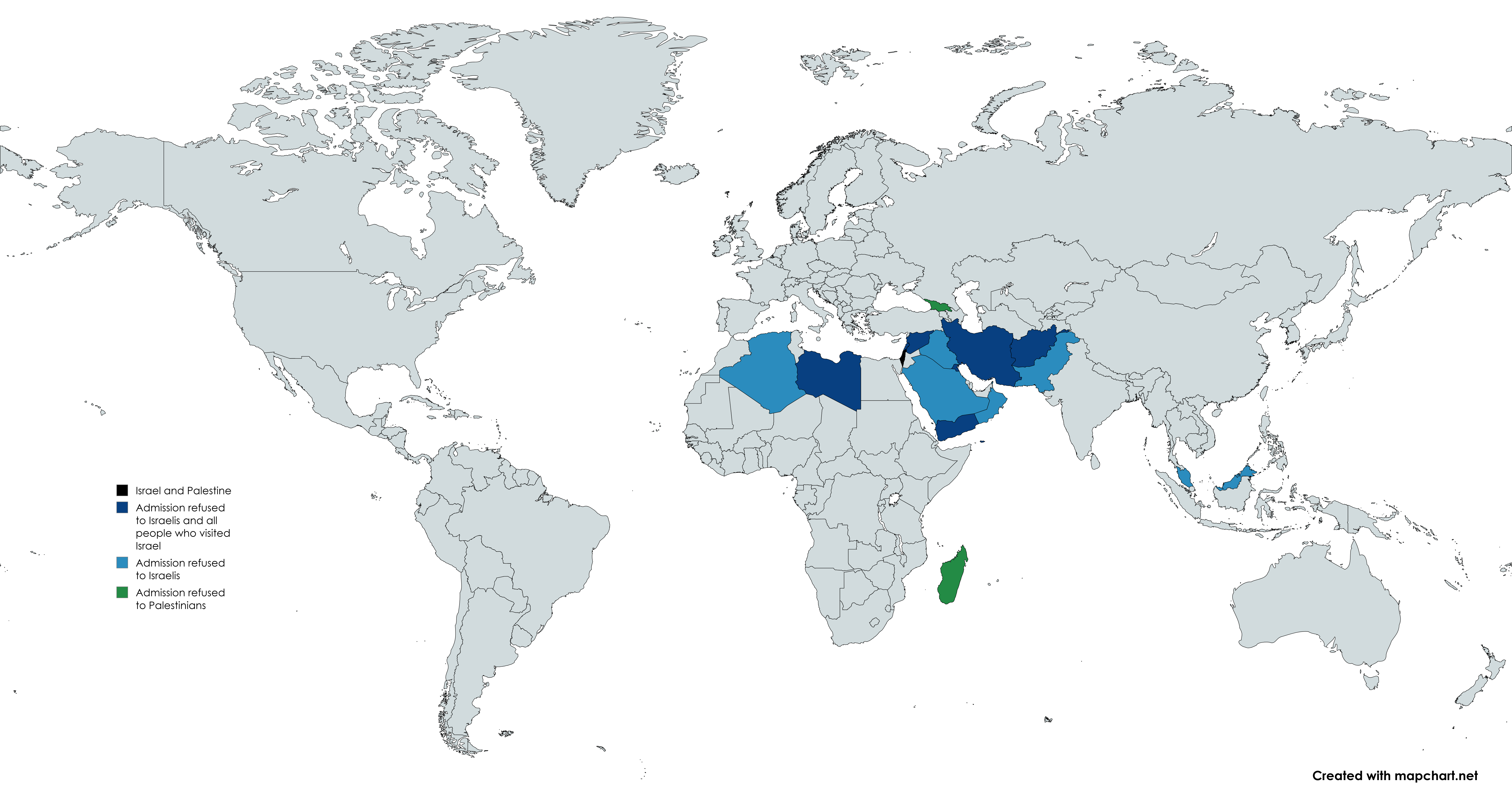Map of Countries Refusing Access to Israeli or Palestinian Citizens


Marcus Rodriguez
Historical Geography Expert
Marcus Rodriguez specializes in historical cartography and geographic data analysis. With a background in both history and geography, he brings unique...
Geographic Analysis
What This Map Shows
The map titled "Countries refusing access to Israeli or Palestinian citizens" provides a clear visual representation of the geopolitical landscape regarding travel restrictions faced by individuals from Israel and Palestine. It highlights the nations that have imposed barriers, whether through visa denials, travel bans, or diplomatic policies. This visualization serves as a critical tool for understanding the complex web of international relations and the implications these restrictions have on both individuals and the broader political climate.
Deep Dive into Access Restrictions
Access restrictions for Israeli and Palestinian citizens are deeply rooted in historical, political, and social contexts. Interestingly, the dynamics surrounding these restrictions can often reflect geopolitical alliances and tensions. Various countries have different policies based on their diplomatic relations with Israel and Palestine. For instance, countries that support the Palestinian cause may impose stricter regulations on Israeli citizens, while those with strong ties to Israel might restrict Palestinian access.
The reasons behind these restrictions are multifaceted. For example, many countries in the Middle East and North Africa refuse entry to Israeli passport holders due to longstanding political stances against the Israeli government and its policies towards Palestinians. According to reports, nations such as Lebanon, Syria, and Yemen have strict laws prohibiting entry for Israeli citizens, reflecting their support for Palestinian rights and resistance to Israeli occupation.
Conversely, access for Palestinian citizens is often limited in countries that recognize Israel. For instance, several Gulf states have historically imposed restrictions on Palestinian travelers, citing security concerns or political alignment with certain Israeli policies. This dynamic creates a challenging situation for Palestinians seeking opportunities abroad, whether for work, education, or family visits.
Furthermore, the global political landscape can shift, altering access policies. Some countries may change their stance based on international pressure or changes in leadership. For example, in recent years, there have been discussions around normalizing relations with Israel in several Arab nations, leading to the possibility of changing access conditions for Israeli and Palestinian citizens. However, such shifts can be contentious and are often met with public resistance.
Regional Analysis
When examining the map closely, it becomes evident that access restrictions vary significantly by region. In the Middle East, countries like Iran and Iraq have firm policies against Israeli citizens, consistent with their support for Palestine. Meanwhile, nations such as Egypt and Jordan, which share borders with Israel, have more nuanced policies, allowing limited access under specific conditions but still maintaining a complex relationship with both parties.
In contrast, European nations typically have more lenient policies towards Israeli citizens, although some demonstrate a growing sensitivity to Palestinian issues. For instance, Sweden and Ireland have recognized Palestinian statehood but still allow Israeli tourists and business travelers. This balance reflects the ongoing debates within these countries about the Israeli-Palestinian conflict.
Interestingly, countries outside the Middle East also exhibit varied approaches. For example, many Western nations allow entry to Israelis but have specific regulations impacting Palestinian travelers. The United States, while a strong ally of Israel, has faced criticism for its policies that affect Palestinian citizens, particularly regarding travel to the U.S. under specific visa requirements.
Significance and Impact
Understanding these travel restrictions is crucial for grasping the broader implications of the Israeli-Palestinian conflict. These barriers not only affect individual citizens trying to navigate their lives but also influence diplomatic relations, international cooperation, and humanitarian efforts. The restrictions can hinder economic opportunities, limit access to education, and create significant emotional distress for families separated by borders.
Moreover, as global perspectives shift, the future of travel access for Israeli and Palestinian citizens remains uncertain. Trends indicate that as international awareness of the Palestinian issue grows, more countries might reconsider their policies, potentially leading to a more open dialogue and engagement. However, this change could also provoke backlash from groups that support stricter access controls based on national security or political beliefs.
In conclusion, the map serves as a vital reminder of the ongoing complexities surrounding travel access for Israeli and Palestinian citizens. It highlights the intricate interplay between geography, politics, and human rights, encouraging further discussion and reflection on this critical global issue.
Comments
Loading comments...